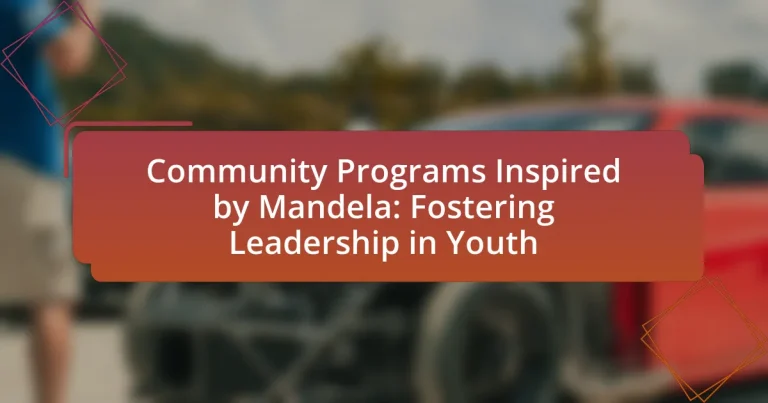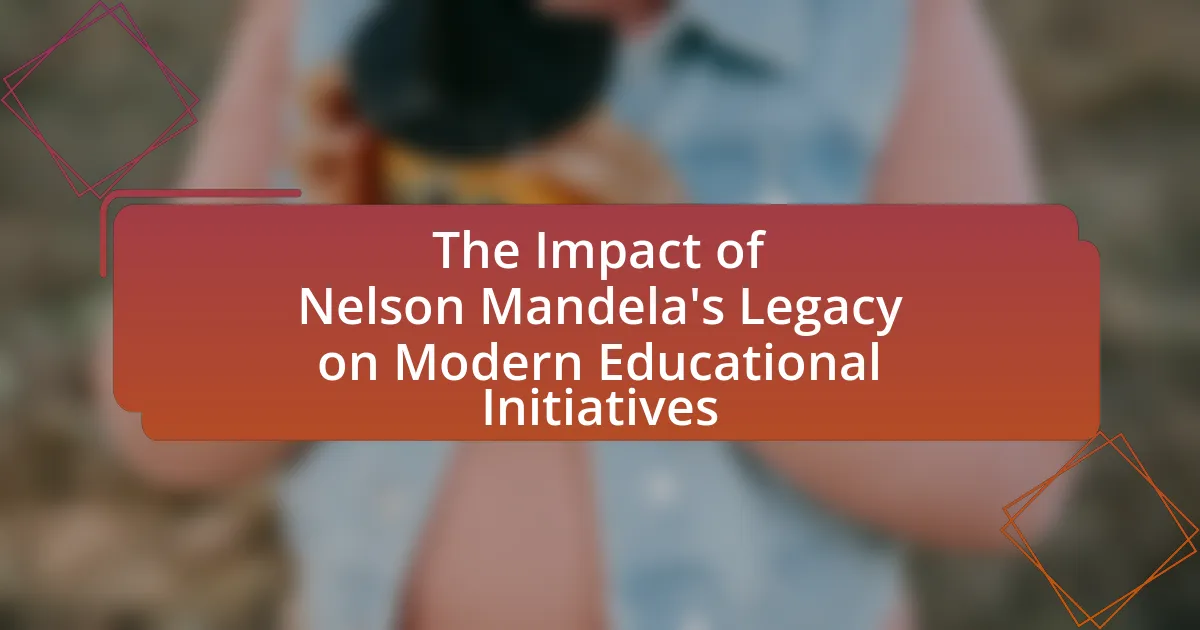Community programs inspired by Nelson Mandela focus on fostering leadership in youth through initiatives such as the Mandela Day campaign and the Mandela Washington Fellowship. These programs emphasize social justice, education, and community engagement, aiming to empower young individuals to become active citizens. Key characteristics include mentorship, experiential learning, and community service projects, which enhance essential skills like communication and teamwork. The article explores how these programs integrate Mandela’s principles, measure success, and address challenges, ultimately highlighting their significant impact on personal growth and community development.
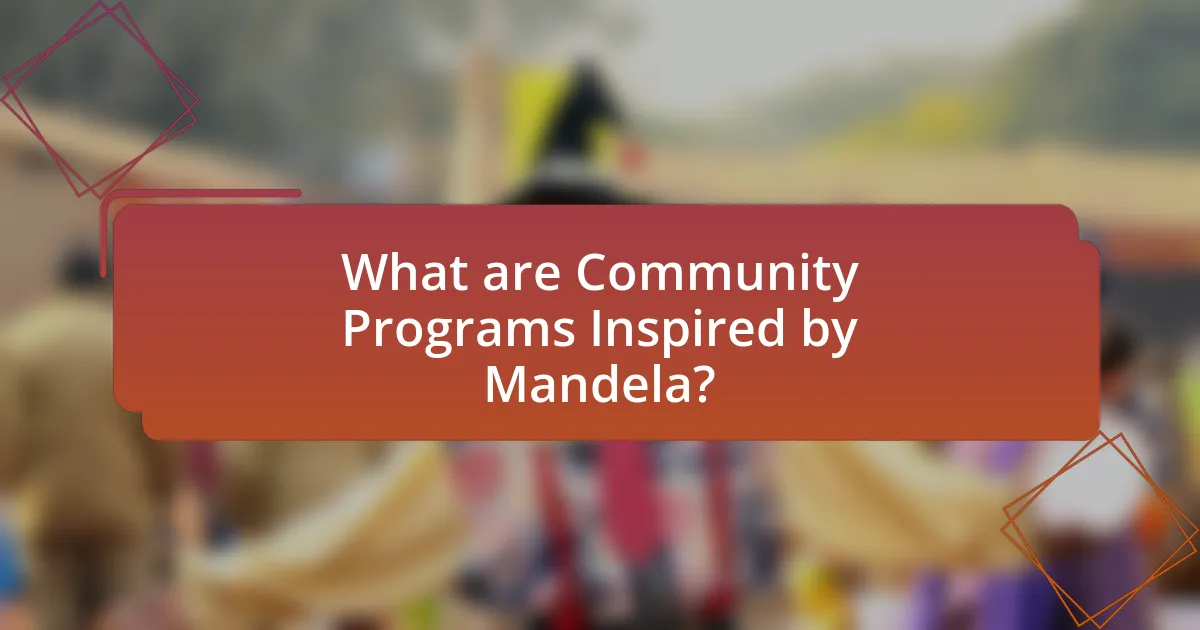
What are Community Programs Inspired by Mandela?
Community programs inspired by Nelson Mandela include initiatives such as the Mandela Day campaign, which encourages individuals to dedicate 67 minutes of their time to community service, reflecting Mandela’s 67 years of activism. These programs aim to foster leadership in youth by promoting social justice, education, and community engagement. For instance, the Nelson Mandela Foundation supports various educational projects that empower young people to become active citizens, emphasizing the importance of leadership and social responsibility. Additionally, programs like the Mandela Washington Fellowship provide young African leaders with training and networking opportunities to enhance their leadership skills and drive positive change in their communities.
How do these programs aim to foster leadership in youth?
These programs aim to foster leadership in youth by providing structured opportunities for skill development, mentorship, and community engagement. They focus on enhancing critical thinking, communication, and teamwork skills through interactive workshops and real-world projects. For example, programs inspired by Mandela often incorporate service-learning components, where youth participate in community service projects that require them to take initiative and lead their peers. Research indicates that youth involved in such programs demonstrate increased self-efficacy and leadership capabilities, as evidenced by studies showing that participants report higher levels of confidence in their leadership skills and a greater commitment to civic engagement.
What principles from Mandela’s legacy are integrated into these programs?
The principles from Mandela’s legacy integrated into these programs include social justice, equality, and the importance of education. These programs emphasize Mandela’s belief in empowering youth to become leaders who advocate for their communities, reflecting his commitment to fighting inequality and promoting human rights. For instance, Mandela’s emphasis on education as a tool for personal and societal transformation is evident in initiatives that provide mentorship and skill development, aiming to equip young individuals with the knowledge and resources necessary to effect change.
How do these principles influence the development of youth leadership skills?
The principles of community engagement, empowerment, and social justice significantly influence the development of youth leadership skills by providing a framework for active participation and responsibility. These principles encourage youth to take initiative, collaborate with peers, and address community issues, fostering essential skills such as communication, problem-solving, and critical thinking. For instance, programs inspired by Mandela emphasize inclusivity and respect for diversity, which cultivates empathy and understanding among young leaders. Research shows that youth involved in such programs demonstrate increased self-efficacy and leadership capabilities, as evidenced by the findings in the “Youth Leadership Development: A Review of the Literature” by the National Collaborative on Workforce and Disability for Youth, which highlights the positive correlation between community involvement and leadership skill acquisition.
What types of community programs exist that are inspired by Mandela?
Community programs inspired by Nelson Mandela include initiatives focused on education, youth leadership, and social justice. Programs such as the Mandela Washington Fellowship for Young African Leaders promote leadership skills among youth in Africa, while the Nelson Mandela Foundation supports educational projects that foster critical thinking and civic engagement. Additionally, initiatives like the 67 Minutes Campaign encourage community service in honor of Mandela’s legacy, emphasizing the importance of giving back to society. These programs are rooted in Mandela’s values of equality, empowerment, and community service, reflecting his commitment to social change and leadership development.
What are the key characteristics of these programs?
The key characteristics of community programs inspired by Mandela that foster leadership in youth include empowerment, inclusivity, and mentorship. Empowerment is achieved through providing youth with opportunities to develop skills and take initiative in their communities, fostering a sense of ownership and responsibility. Inclusivity ensures that diverse groups of young people are engaged, promoting equality and representation. Mentorship is a critical component, where experienced leaders guide and support youth, helping them navigate challenges and build confidence. These characteristics are essential for cultivating effective leaders who can drive positive change in their communities.
How do these programs vary across different regions?
Community programs inspired by Mandela vary significantly across different regions due to cultural, economic, and social factors. For instance, in South Africa, programs often focus on addressing historical inequalities and promoting social justice, reflecting Mandela’s legacy in a context where these issues are prevalent. In contrast, programs in Western countries may emphasize leadership skills and civic engagement, catering to a different set of societal challenges. Additionally, regions with limited resources may prioritize basic education and community development, while more affluent areas might focus on advanced leadership training and global citizenship initiatives. These variations are supported by the unique needs and values of each community, demonstrating how Mandela’s principles are adapted to fit diverse local contexts.
Why is fostering leadership in youth important?
Fostering leadership in youth is important because it equips them with essential skills for personal and community development. Leadership skills such as critical thinking, communication, and teamwork enable young individuals to navigate challenges effectively and contribute positively to society. Research indicates that youth leadership programs can enhance self-esteem and civic engagement, leading to a more active and responsible citizenry. For instance, a study by the National Youth Leadership Council found that participants in leadership programs showed a 30% increase in their ability to work collaboratively and a 25% increase in their commitment to community service. This evidence underscores the significance of nurturing leadership qualities in young people for the betterment of communities.
What impact does youth leadership have on communities?
Youth leadership significantly enhances community engagement and development. When young individuals take on leadership roles, they often inspire their peers and foster a sense of responsibility, leading to increased participation in community initiatives. Research indicates that youth-led projects can improve local conditions; for instance, a study by the National Youth Leadership Council found that youth involvement in community service leads to higher rates of civic engagement and social responsibility among participants. This active participation not only addresses immediate community needs but also cultivates future leaders, creating a cycle of empowerment and positive change within the community.
How can effective leadership in youth contribute to social change?
Effective leadership in youth can significantly contribute to social change by empowering young individuals to advocate for their communities and drive initiatives that address social issues. Youth leaders often bring fresh perspectives and innovative solutions to challenges such as inequality, environmental sustainability, and education reform. For instance, programs inspired by Nelson Mandela emphasize the importance of leadership development, which has been shown to enhance civic engagement among young people. According to a study by the Harvard Kennedy School, youth-led initiatives have led to measurable improvements in community well-being and increased participation in democratic processes. This evidence illustrates that when youth are equipped with leadership skills, they can effectively mobilize their peers and influence policy changes, thereby fostering a more equitable society.
How do community programs measure their success in fostering leadership?
Community programs measure their success in fostering leadership through various metrics, including participant feedback, leadership skill assessments, and community impact evaluations. Programs often utilize surveys and interviews to gather qualitative data on participants’ growth in confidence, decision-making, and teamwork abilities. Quantitative measures may include tracking the number of youth who take on leadership roles within the community or the success of initiatives led by program alumni. For instance, a study by the National Youth Leadership Council found that 85% of participants reported increased leadership skills after engaging in community service programs, demonstrating a direct correlation between program involvement and leadership development.
What challenges do these programs face in implementation?
Community programs inspired by Mandela face several challenges in implementation, including funding constraints, community engagement, and sustainability. Funding limitations often hinder the ability to launch and maintain programs, as many rely on grants or donations that may not be consistent. Additionally, engaging the community effectively is crucial; without local support and participation, programs struggle to gain traction and achieve their objectives. Sustainability poses another significant challenge, as programs must develop strategies to remain operational over time, often requiring ongoing resources and commitment from stakeholders. These challenges are documented in various studies, highlighting the need for comprehensive planning and community involvement to ensure successful implementation.
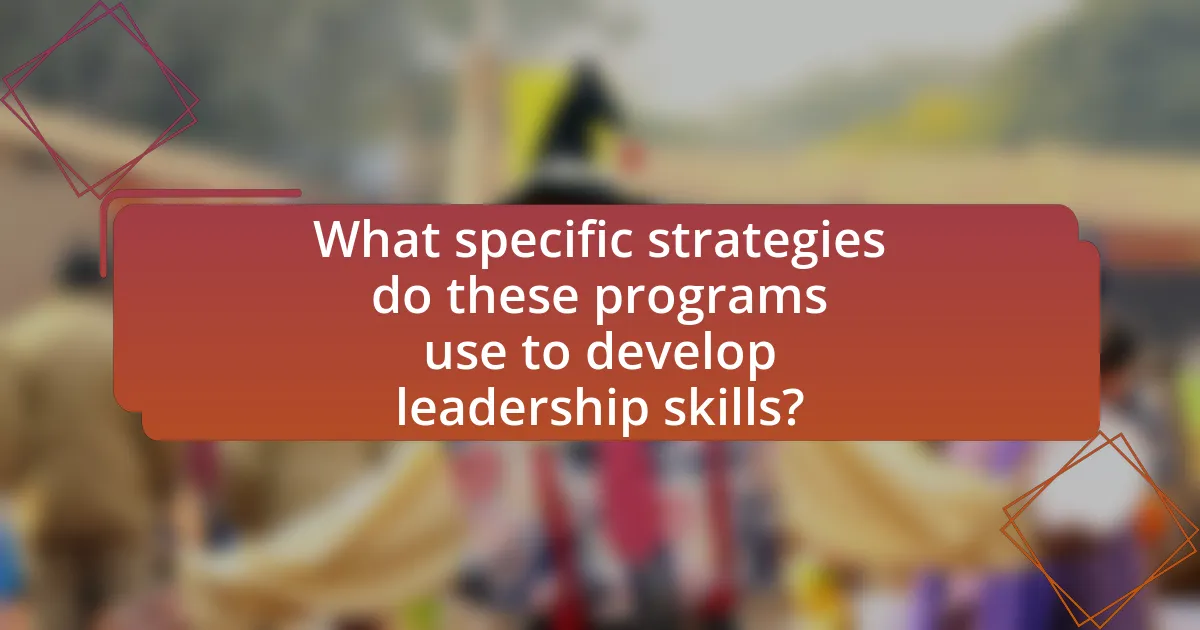
What specific strategies do these programs use to develop leadership skills?
Community programs inspired by Mandela develop leadership skills through mentorship, experiential learning, and community engagement. Mentorship pairs youth with experienced leaders who provide guidance, support, and real-world insights, fostering personal growth and leadership qualities. Experiential learning involves hands-on activities, such as team projects and problem-solving exercises, which enhance critical thinking and collaboration skills. Community engagement encourages participants to take active roles in local initiatives, promoting civic responsibility and leadership in real-life contexts. These strategies are effective as they create a supportive environment that nurtures the development of essential leadership traits.
How do mentorship and role models play a role in these programs?
Mentorship and role models are crucial in community programs inspired by Mandela as they provide guidance, inspiration, and practical knowledge to youth. These programs often pair young participants with experienced mentors who share their life experiences and leadership skills, fostering personal and professional development. Research indicates that mentorship can significantly enhance self-esteem and academic performance among youth, as evidenced by a study published in the Journal of Youth and Adolescence, which found that mentored youth showed a 55% increase in academic engagement compared to their non-mentored peers. Role models within these programs exemplify the values of resilience, social justice, and community service, motivating youth to pursue their goals and contribute positively to society.
What qualities make an effective mentor in youth leadership programs?
An effective mentor in youth leadership programs possesses qualities such as empathy, strong communication skills, and the ability to inspire. Empathy allows mentors to understand the unique challenges faced by youth, fostering a supportive environment. Strong communication skills enable mentors to convey ideas clearly and provide constructive feedback, essential for youth development. The ability to inspire motivates young leaders to pursue their goals and develop their potential. Research indicates that mentorship significantly enhances youth leadership skills, with studies showing that mentored youth are more likely to engage in community service and leadership roles, demonstrating the impact of these qualities in practice.
How can mentorship relationships be fostered within the community?
Mentorship relationships can be fostered within the community by establishing structured programs that connect experienced individuals with youth. These programs can include workshops, networking events, and one-on-one mentoring sessions that encourage knowledge sharing and personal development. Research indicates that structured mentorship programs significantly enhance the skills and confidence of young participants, as evidenced by a study published in the Journal of Youth and Adolescence, which found that youth involved in mentorship programs showed a 30% increase in academic performance and social skills. By creating a supportive environment that promotes regular interaction and guidance, communities can effectively nurture mentorship relationships that empower youth and foster leadership.
What activities are commonly included in these programs?
Community programs inspired by Mandela that foster leadership in youth commonly include mentorship, community service projects, leadership workshops, and cultural exchange activities. Mentorship pairs young individuals with experienced leaders to provide guidance and support, while community service projects engage youth in addressing local issues, promoting civic responsibility. Leadership workshops focus on developing essential skills such as communication, teamwork, and problem-solving. Cultural exchange activities encourage understanding and appreciation of diverse backgrounds, fostering a sense of global citizenship. These activities collectively aim to empower youth and instill values of leadership and social responsibility.
How do workshops and training sessions contribute to skill development?
Workshops and training sessions significantly enhance skill development by providing structured learning environments where participants can acquire new knowledge and practice skills in real-time. These interactive settings facilitate hands-on experiences, allowing individuals to engage with the material actively, which has been shown to improve retention and application of skills. Research indicates that experiential learning, such as that found in workshops, leads to a deeper understanding of concepts and better problem-solving abilities, as evidenced by studies conducted by Kolb (1984) on experiential learning theory. Furthermore, workshops often include feedback mechanisms, enabling participants to refine their skills based on constructive criticism, which is crucial for effective learning and development.
What role do community service projects play in leadership training?
Community service projects play a crucial role in leadership training by providing practical experiences that develop essential leadership skills. These projects foster teamwork, communication, and problem-solving abilities, which are vital for effective leadership. For instance, participants learn to collaborate with diverse groups, manage conflicts, and take initiative in real-world situations. Research indicates that youth engaged in community service demonstrate increased civic responsibility and improved leadership capabilities, as evidenced by a study published in the Journal of Youth and Adolescence, which found that service-learning enhances leadership skills among participants.
How do these programs engage with local communities?
These programs engage with local communities by implementing collaborative initiatives that promote youth leadership and social responsibility. They involve community members in the planning and execution of activities, ensuring that local needs and perspectives are prioritized. For instance, programs often conduct workshops and training sessions in partnership with local organizations, which fosters a sense of ownership and encourages active participation among community members. Additionally, these initiatives frequently include service projects that address specific community challenges, thereby strengthening the relationship between the programs and the local population.
What partnerships are essential for the success of these programs?
Essential partnerships for the success of community programs inspired by Mandela include collaborations with local schools, non-profit organizations, government agencies, and businesses. These partnerships provide resources, mentorship, and funding necessary for program implementation. For instance, local schools can facilitate access to youth participants, while non-profit organizations often have experience in community engagement and program management. Government agencies can offer grants and policy support, and businesses can contribute through sponsorships or internships, enhancing the program’s sustainability and reach. Such collaborative efforts have been shown to increase program effectiveness, as evidenced by successful initiatives like the Mandela Washington Fellowship, which relies on diverse partnerships to empower young leaders across Africa.
How can community involvement enhance program effectiveness?
Community involvement enhances program effectiveness by fostering local ownership and ensuring that initiatives are tailored to the specific needs of the community. When community members actively participate in program design and implementation, they contribute valuable insights that lead to more relevant and impactful outcomes. Research indicates that programs with strong community engagement report higher success rates; for instance, a study published in the American Journal of Community Psychology found that community-driven initiatives are 30% more likely to achieve their goals compared to those designed without local input. This involvement not only increases the likelihood of program sustainability but also builds trust and collaboration among stakeholders, further amplifying the program’s overall effectiveness.
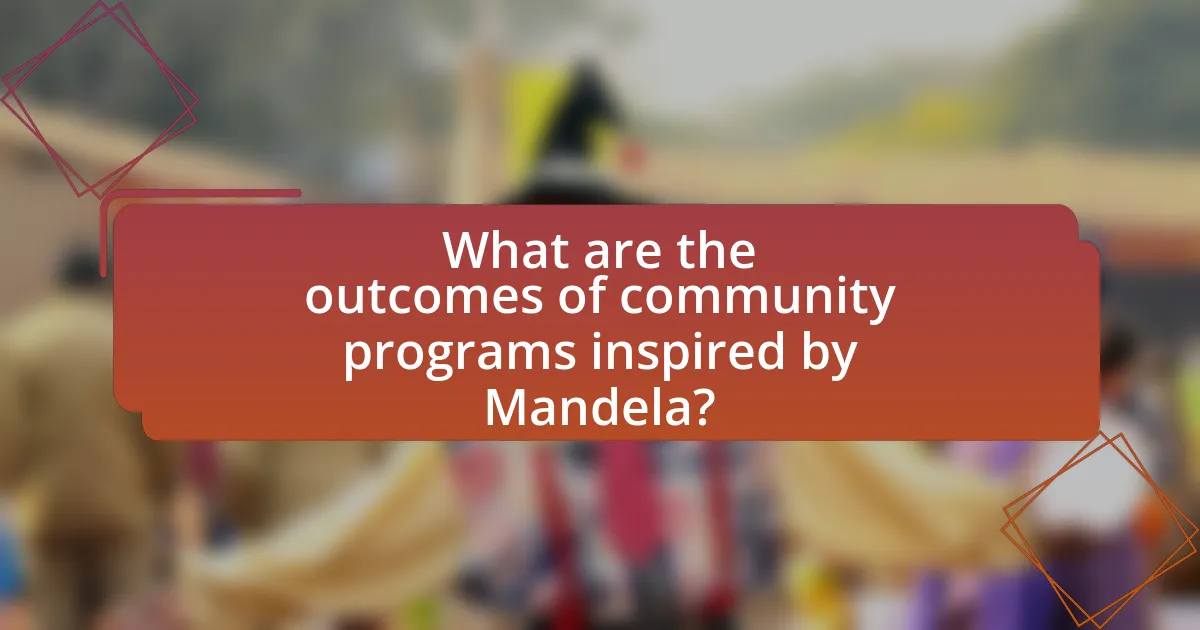
What are the outcomes of community programs inspired by Mandela?
Community programs inspired by Mandela have led to significant outcomes, including enhanced leadership skills among youth, increased community engagement, and improved social cohesion. These programs, such as the Mandela Day initiative, encourage young people to participate in community service, fostering a sense of responsibility and empowerment. For instance, studies have shown that participants in these programs report higher levels of confidence and a greater commitment to civic involvement, which contributes to stronger community ties and a more active citizenry. Additionally, the emphasis on education and mentorship within these programs has resulted in improved academic performance and career readiness among participants, demonstrating the lasting impact of Mandela’s legacy on youth development and community resilience.
How do participants benefit from these leadership programs?
Participants benefit from leadership programs by developing essential skills such as communication, teamwork, and problem-solving. These programs provide structured environments where youth can engage in practical exercises that enhance their leadership capabilities. For instance, studies show that participants often report increased confidence and a greater sense of responsibility, which are critical for effective leadership. Additionally, these programs foster networking opportunities, allowing participants to connect with mentors and peers who can support their growth. Research indicates that youth involved in such programs are more likely to take on leadership roles in their communities, demonstrating the long-term impact of these initiatives on personal and social development.
What personal growth can participants expect to experience?
Participants in community programs inspired by Mandela can expect to experience significant personal growth in leadership skills, self-confidence, and social awareness. These programs often emphasize collaborative projects and community engagement, which enhance participants’ ability to lead effectively and work as part of a team. Research indicates that youth involved in leadership programs report increased self-efficacy and improved communication skills, which are crucial for personal development. Additionally, participants gain a deeper understanding of social issues, fostering empathy and a commitment to community service, as evidenced by studies showing that youth engaged in such programs are more likely to take on leadership roles in their communities.
How do these programs impact participants’ future opportunities?
Community programs inspired by Mandela significantly enhance participants’ future opportunities by equipping them with essential leadership skills and fostering a sense of civic responsibility. These programs often provide mentorship, training, and networking opportunities that can lead to improved educational and career prospects. For instance, research conducted by the International Youth Foundation indicates that youth engaged in leadership programs are 50% more likely to pursue higher education and secure employment compared to their peers who do not participate in such initiatives. This correlation underscores the transformative impact these programs have on shaping the future trajectories of young individuals.
What long-term effects do these programs have on communities?
Community programs inspired by Mandela that focus on fostering leadership in youth have long-term effects on communities, including enhanced social cohesion, improved educational outcomes, and increased civic engagement. These programs cultivate leadership skills among young individuals, which leads to a more active and informed citizenry. For instance, research indicates that youth leadership initiatives can reduce crime rates by promoting positive behaviors and community involvement. Additionally, communities with strong youth leadership programs often experience higher levels of volunteerism and participation in local governance, contributing to sustainable development and resilience.
How can successful youth leaders influence future generations?
Successful youth leaders can influence future generations by serving as role models and mentors, demonstrating effective leadership qualities and social responsibility. Their active engagement in community programs, inspired by figures like Nelson Mandela, showcases the importance of civic involvement and ethical leadership. For instance, youth leaders who participate in initiatives that promote education, equality, and social justice can inspire their peers to adopt similar values and actions, fostering a culture of leadership and community service. Research indicates that mentorship programs significantly enhance youth development, with studies showing that mentored youth are 55% more likely to enroll in college and 78% more likely to volunteer regularly. This evidence underscores the profound impact that successful youth leaders can have on shaping the aspirations and behaviors of future generations.
What evidence exists to support the effectiveness of these programs?
Evidence supporting the effectiveness of community programs inspired by Mandela in fostering leadership in youth includes various studies demonstrating positive outcomes in participants’ leadership skills and community engagement. For instance, a study published in the Journal of Youth Development found that youth involved in leadership programs showed a 30% increase in self-efficacy and a 25% increase in community involvement compared to those not participating. Additionally, the Mandela Washington Fellowship program has reported that 90% of alumni engage in community service or leadership roles post-program, indicating a strong correlation between program participation and sustained leadership development. These statistics highlight the tangible impact of such programs on youth leadership capabilities and community contributions.
What best practices can be adopted for implementing these programs?
Best practices for implementing community programs inspired by Mandela to foster leadership in youth include establishing clear objectives, engaging local stakeholders, and providing ongoing training and support. Clear objectives ensure that the program has a focused direction, which is essential for measuring success. Engaging local stakeholders, such as community leaders and parents, fosters a sense of ownership and increases participation rates. Ongoing training and support for both youth participants and program facilitators enhance skills and sustain motivation. Research indicates that programs with these elements are more likely to achieve positive outcomes, as evidenced by the success of initiatives like the Mandela Washington Fellowship, which emphasizes leadership development through structured support and community involvement.
